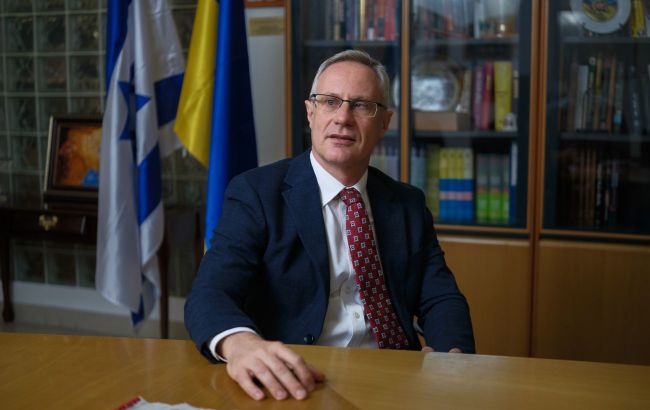Israel could strike deals with Syria, Lebanon, and Saudi Arabia - Ambassador
 Photo: Israeli Ambassador to Ukraine Michael Brodsky (Vitalii Nosach, RBC-Ukraine)
Photo: Israeli Ambassador to Ukraine Michael Brodsky (Vitalii Nosach, RBC-Ukraine)
After October 7, a new era began in the Middle East. Hamas and its allies failed to achieve their goals, while Israel moved closer to a diplomatic breakthrough, says Israeli Ambassador to Ukraine Michael Brodsky in an interview with RBC-Ukraine.
By organizing the attack on October 7, 2023, Hamas hoped for support from Hezbollah, the Houthis, and Iran to bring Israel to its knees, he said.
But the opposite happened: Hamas militants were defeated in the Gaza Strip, Hezbollah in Lebanon, and Iran’s nuclear program, according to the diplomat, was pushed back by several years.
It creates conditions for the expansion of the Abraham Accords, peace agreements between Israel and a number of Arab countries.
Negotiations are currently underway with Syria, Lebanon, and Saudi Arabia.
He added that Israel is not just a strong and influential state, but a country you need to be friends with - and benefit from this friendship.
The US is the key player
According to Brodsky, the main driving force is the United States, which is capable of offering political and economic dividends to its partners in the region.
Progress also became possible thanks to a change of power in Syria. The new leadership is less aggressively inclined against Israel.
The ambassador also recalled that in Lebanon, the army has for the first time in a long while started to actually control the southern territories of the country.
This, along with the weakening of Hezbollah, opens the path for Lebanon to join the Abraham Accords.
Syria and the Golan
When asked about Syria’s possible withdrawal of its claims to the Golan Heights, Brodsky responded cautiously.
He emphasized that Israel is ready for dialogue and sees potential in building new ties.
Especially considering the positive experience of cooperation with the UAE following the signing of the peace agreement. Active trade, technology exchange, and tourism development are taking place.
Ceasefire in Gaza
US President Donald Trump stated earlier that Jerusalem agreed to a 60-day ceasefire. Hamas responded by saying it viewed the proposal positively.
Israeli Prime Minister Benjamin Netanyahu, before departing for the US, where he would meet with Trump, said he opposes any deal under which Hamas would remain in Gaza.
More on the three key changes in the potential deal proposed by Hamas - in the RBC-Ukraine report.

